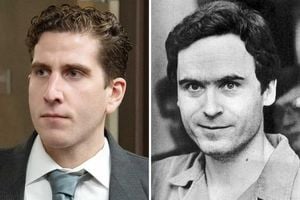Sean Baker made history at the 2025 Academy Awards by becoming the first person ever to win four Oscars for the same film, taking home statues for Best Director, Best Picture, Best Original Screenplay, and Best Editing for his critically acclaimed movie, Anora.
The Oscars ceremony, held on March 2, 2025, witnessed Baker's remarkable ascent as he tied with the legendary Walt Disney, who won four Oscars for four different films back in 1954. This year, all of Baker's accolades came from Anora, which has captivated audiences and critics alike, grossing approximately $40 million.
“We’re all here tonight and watching this broadcast because we love movies. Where did we fall in love with the movies? At the movie theater,” Baker said during his acceptance speech, emphasizing the importance of the cinema experience. He thanked the Academy for recognizing independent cinema, which has often been overshadowed by big-budget blockbusters.
Anora presents the gritty tale of a stripper who navigates the treacherous waters of wealth, power, and love, believing she struck it rich with the son of a Russian oligarch. The film, which explores themes of immigration and the global capitalist narrative, also reflects Baker’s compassion for marginalized communities, making it typical of his oeuvre. “This is a tragedy with comedic elements,” Baker stated, describing the film's unique blend of humor and heart-wrenching storytelling.
The success of Anora is also credited to its exceptional cast, particularly its star, Mikey Madison, who won the Oscar for Best Actress. Her portrayal brought the character to life and earned her recognition amid fierce competition, including favorite Demi Moore for her role in The Substance. Baker expressed his happiness for her win, noting the film’s commitment to showcasing the talent of newcomers and non-professional actors.
With this year’s Oscars, Baker finally received personal recognition after years of working on smaller productions, including Tangerine and The Florida Project, which featured both non-professional actors and real-life stories of marginalized individuals. Baker has always been passionate about representing overlooked narratives through his art. “I like to see it as people who are chasing the American dream, but don’t have easy access to it,” he once explained, underscoring the motivation behind his storytelling.
During his speech, Baker also issued a passionate plea for filmmakers to continue creating films for the big screen, lamenting the decline of theaters due to the COVID-19 pandemic. “This is my battle cry. Filmmakers: Keep making films for the big screen. I know I will,” he asserted, reinforcing his commitment to independent filmmaking amid the rise of streaming platforms.
Baker's triumph at this year’s ceremony has not only spotlighted his career but has also ignited discussions around the significance of independent films within the broader Hollywood narrative. Tied to Disney's legendary record, Baker’s feat raises questions about the changing face of film recognition and what it means for future filmmakers.
With Anora hailed as one of the finest films, it has not only achieved awards but also accolades from prestigious gatherings like the Cannes Film Festival, where it won the Palme d'Or. The film has become synonymous with what many are calling the 'indie renaissance', celebrating authentic storytelling and raw talent. Baker's work—and his newfound acclaim—demonstrates the resonance and impact of films told from unique perspectives.
The night also saw other accolades awarded, including Best Supporting Actor going to Yura Borisov for his role alongside Baker’s narrative. With this Oscar season reflecting on the diversity of storytelling and representation, Baker’s success brings hopes for simpler narratives centered on the very human experiences often overlooked.
Sean Baker’s four Oscar wins for Anora signify the culmination of years dedicated to portraying the lives of everyday individuals, challenging stereotypes, and reshaping conversations about marginalized communities. It has marked not just personal achievement for Baker—who previously had not received any nominations—but also points to the potential for greater recognition of independent films moving forward.
Indeed, with Baker's groundbreaking evening, the future looks promising for indie cinema as it navigates its way through the changing landscapes of both the industry and cultural appetites for storytelling. Observers and residents alike are likely to be captivated by the continuing developments of Baker's career, as he pursues stories worthy of the big screen.



